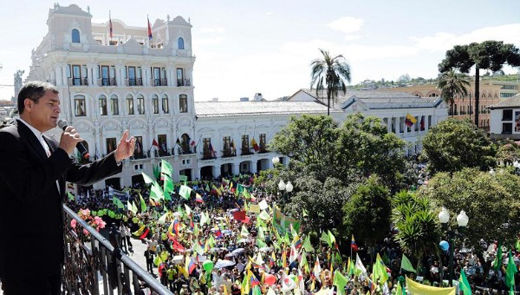
On June 5, Ecuador’s left-wing president, Rafael Correa, announced that he was sending to his legislature a proposed tax reform bill to moderately increase inheritance taxes and to make other adjustments in the tax laws.
Last week, right-wing protesters besieged the offices of Correa’s “Alianza Pais” party in the capital of Quito. To demands that the tax reform bill be withdrawn were soon added calls for Correa to step down, in spite of the fact that he won his last election (in 2013) by a solid 57 percent margin. Violence has also been part of the demonstrations, and Correa says that a major destabilization effort is afoot.
Anti-Correa demonstrators have issued calls asking for the army to be ready to intervene, and on Sunday attempted to block roads from Quito’s airport to prevent the president from returning from a European trip.
In most Latin American countries, including those with relatively progressive governments, huge wealth disparities are an obstacle to the pursuit of social justice and greater democracy. Much of the wealth of the Latin American “one percent” is inherited, often in the form of non-transparent trusts, and tax laws have not been tough enough to tap into these large fortunes for development needs.
Increased graduated income taxes are also resisted. So lower and middle income workers, farmers and small businesspeople end up carrying an especially unfair tax load via consumption taxes, often in a “value added” mode. It was this kind of situation that President Correa set out to modify.
The tax reforms that Correa proposed are modest enough, and by no means “confiscatory”, though their aim is unapologetically redistributive – the government promises that all the new revenues achieved by the reforms will go to benefit the mass of the people directly.
Only about two percent of the population would be affected by the changes in the inheritance law. Under the changes, there would be a 2.5 percent tax on inheritances valued between $35,000 and $70,000. The previous bottom rate was 5 percent on inheritances valued between $69,000 and $137,000, with a top rate of 35 percent charged on inheritances above $827,000.
Under Correa’s plan, the new top rate on the larger fortunes would be 47.5 percent. The plan also proposes stiff taxes on windfall capital gains profits from the sale of real estate, and other adjustments.
The per capita gross domestic product of Ecuador is about $11,000 per year, calculated by the Purchasing Power Parity (PPP) method, compared to about $55,000 a year for the United States.
Correa’s supporters have a huge legislative majority, so it is fairly certain that the proposal will be approved.
Right wing demonstrations are continuing, and are being answered by pro-Correa demonstrations supporting the tax changes, and praising the impressive economic improvements for the poor which Correa has achieved since he was first elected in 2007.
The hint of coup plotting in Ecuador brought out regional memories of a failed attempt by police officers in 2010, bringing statements for support against any coup attempt from Venezuelan President Nicolas Maduro and others.
Photo: Ecuadorean President Rafael Correa addresses a crowd of thousands from the presidential palace in Quito, Ecuador, June 15. | Ecuadorean Presidency

MOST POPULAR TODAY

“Trail of Tears Walk” commemorates Native Americans’ forced removal

After months of denial, U.S. admits to running Ukraine biolabs

‘Warning! This product supports genocide’: Michigan group aims to educate consumers

Ohio: Franklin County treasurer attends Netanyahu meeting, steps up Israel Bond purchases

Hold the communism, please: SFMOMA’s Diego Rivera exhibit downplays artist’s radical politics



Comments